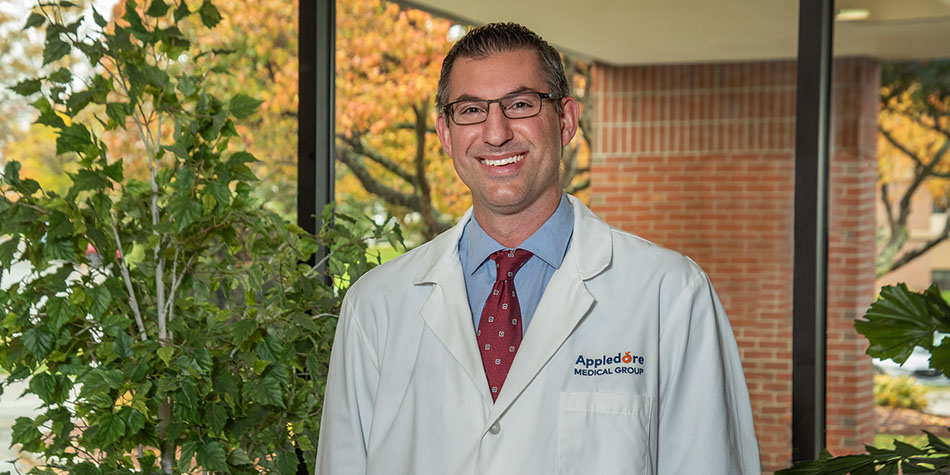
People may first notice a hernia when they lift something heavy — for example, picking up a box and hearing a “pop.” The pain is cause for pause. Could it be a hernia?
According to the National Institute of Diabetes and Digestive and Kidney Diseases, about 27 percent of men and three percent of women will get an inguinal hernia at some point in their lives.
What is an inguinal hernia?
An inguinal hernia refers to a hernia in your inner groin area. Normally, you have a strong wall of muscle protecting your inner groin. But a hernia can happen when there is a weakness or tear in that muscle, causing a hole. An internal organ (your bladder or intestine) or other tissue can poke through that hole, causing pain and a noticeable bulge.
Inguinal hernias are most common in men because of their anatomy. There is an existing hole in the muscle to let blood vessels through, which creates a weak spot. For some people, pressure, often caused by lifting a heavy object, causes that weak area to open and becomes an inguinal hernia.
You might have a hernia if you have any of these symptoms:
- A visible bulge on either side of your pubic bone that disappears when you lie down
- An aching or burning feeling at the bulge
- Pain, weakness, or pressure in your groin, especially when lifting or coughing
More serious signs of a hernia with complications include:
- a bulge that turns a different color
- a bulge that can't be pushed back in
- fever
- nausea or vomiting
- sudden and intense pain
If you experience any of these signs, seek emergency care right away by going to the ER or calling 911.
Do you need surgery to fix your hernia?
Not all hernias need to be repaired, but the only way to repair a hernia is with surgery.
“Hernias don't have to get worse. They can stay the same for many years,” said Scott Philipp, MD, FACS, general surgeon with Nutfield Surgical Associates in Derry, New Hampshire. “But they never get better. There is no time when a hernia will repair itself.”
Dr. Philipp recommends patients consider surgery if their hernia is causing pain or the bulge is getting bigger. After recovering from surgery, patients no longer have the hernia bulge or pain. Most people can return to normal activities with no symptoms.
Minimally invasive robotic hernia surgery
Hernia surgery can be performed using minimally invasive techniques. The surgeon makes three small incisions about one fourth inch long and uses robotic arms as a tool. “The surgeon is in control the entire time—the robot is just another tool we use,” affirms Dr. Philipp. “I use the robot for most hernia surgery because of the significant benefits for most patients and the feedback that I have received after surgery encourages me to use it more often.”
Benefits of minimally invasive robotic hernia repair include:
- Minimal disruption to surrounding muscles
- Quicker return to regular activities
- Less pain during recovery – typically no narcotics are needed
An inguinal hernia is repaired by identifying which tissues have been displaced through an opening in the groin that is not supposed to be there, followed by bringing those tissues back to their normal position and covering the hole with a piece of mesh. In some cases, the hernia defect can be sewn closed with sutures. Placement of mesh is necessary for success of most hernia repairs. There have been some problems caused by use of mesh years ago, but modern mesh is better engineered to be safe and effective and is easily tolerated.
Hernia repair usually takes one to two hours, and you will go home the same day. After your operation, your surgeon will likely recommend you take about a week off from work and avoid any heavy lifting for six weeks. Full recovery takes time, and it may be a few months before you feel completely back to normal.
Dr. Philipp knows his patients sometimes worry their hernia will come back, but that is unlikely. “There are things that can increase the risk of having a hernia repair; however, addressing these risks will significantly limit the already low possibility for recurrence.”
Is surgery right for your hernia?
Have a conversation with a qualified medical professional, like your primary care provider or a general surgeon who specializes in hernia surgery. They can review your unique situation, answer your questions, and address your concerns.
Dr. Philipp is a board-certified and fellowship-trained general surgeon with expertise in robotic hernia surgery and many other minimally invasive and traditional procedures. He is welcoming new patients and referrals as part of the expert care team at Nutfield Surgical Associates, often with next-day appointment availability, and is affiliated with Parkland Medical Center.
Please call (603) 434-7444 to schedule an appointment, or book online.